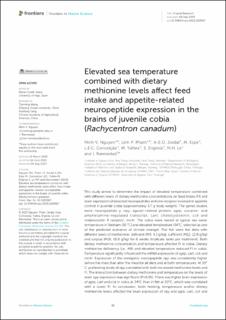Elevated sea temperature combined with dietary methionine levels affect feed intake and appetite-related neuropeptide expression in the brains of juvenile cobia (Rachycentron canadum)
Nguyen, Minh; Pham, Phuong Linh; Jordal, Ann-Elise Olderbakk; Espe, Marit; Conceição, L.E.C.; Yúfera, M.; Engrola, S.; Le, M.H.; Rønnestad, Ivar
Journal article, Peer reviewed
Published version

Åpne
Permanent lenke
https://hdl.handle.net/11250/3100080Utgivelsesdato
2023-07-04Metadata
Vis full innførselSamlinger
- Department of Biological Sciences [2235]
- Registrations from Cristin [9791]
Sammendrag
This study aimed to determine the impact of elevated temperature combined with different levels of dietary methionine concentrations on feed intake (FI) and brain expression of selected neuropeptides and one receptor involved in appetite control in juvenile cobia (approximately 3.7 g body weight). The genes studies were neuropeptide y, npy; agouti-related protein, agrp; cocaine- and amphetamine-regulated transcript, cart; cholecystokinin, cck and melanocortin 4 receptor; mc4r. The cobia were reared at typical sea water temperature in Vietnam (30 °C) and elevated temperature (34°C; selected as one of the predicted scenarios of climate change). The fish were fed diets with different levels of methionine: deficient (M9; 9.1 g/kg), sufficient (M12; 12.8 g/kg) and surplus (M16, 16.8 g/kg) for 6 weeks (triplicate tanks per treatment). Both dietary methionine concentration and temperature affected FI in cobia. Dietary methionine deficiency (i.e., M9) and elevated temperature reduced FI in cobia. Temperature significantly influenced the mRNA expression of agrp, cart, cck and mc4r. Expression of the orexigenic neuropeptide npy was consistently higher before the meal than after the meal for all diets and at both temperatures. At 30°C, prefeeding levels of npy correlated with both increased methionine levels and FI. The interaction between dietary methionine and temperature on the levels of brain npy expression was significant (P<0.05). There was higher brain expression of agrp, cart and cck in cobia at 34°C than in fish at 30°C, which was correlated with a lower FI. In conclusion, both feeding, temperature and/or dietary methionine levels affected the brain expression of npy and agrp, cart, cck and mc4r. This suggests that these neuropeptides as well as the mc4r receptor are actively involved in adjusting feed intake to compensate for changing energetic demands, as well as metabolic adjustments due to the variable availability of methionine at elevated temperature.
